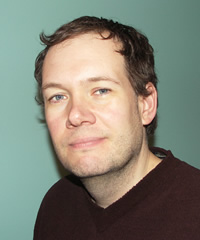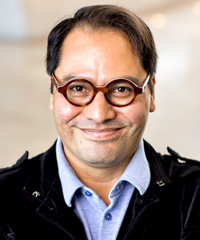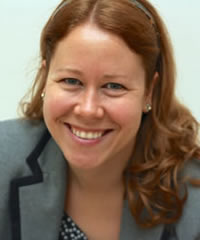Galbut Outstanding Faculty Award
Presented to a faculty member who has been outstanding in teaching and in efforts to engage students both inside and outside the classroom; selected from outstanding faculty members nominated by School of Communication students; established by the Galbut family
Erik Gernand

Erik Gernand is a senior lecturer in the Department of Radio/Television/Film as well as an award-wining writer and filmmaker whose short films have been screened at more than 100 film festivals worldwide. Gernand primarily teaches first-year students an introductory filmmaking course and foundations of screenwriting. In order to acclimate new students to the department and pace of courses, Gernand in 2011 created the First-Year Filmmakers Festival, during which students have 48 hours to make a short film inspired by short prompts and ample student-to-student collaborating and mentoring. Gernand also co-created in 2012 the Sitcom Sequence in which students write an original sitcom pilot in Fall Quarter, a jury selects the winning script, those writers and producers then go to Los Angeles over Spring Break to visit sets and meet with industry leaders, and then they return to produce the pilot in the Spring Quarter.
“Gernand is especially noteworthy for the level of passion and empathy which he brings to his classes,” says one student. “I’d been his student for an entire year, and never had I seen him waver in his steadfast commitment in bringing the best out of his students and projecting his love of craft into his lesson plans…He’s the kind of teacher that students are actively excited in working with, and indeed his enthusiasm never fails to excite us.”
Another student notes: “What was important about this introductory screenwriting class is how Erik treated us like professionals…Sitting around that table and giving each other ideas, gave us a glimpse of the world we all wanted to be a part of.”
One graduate student recalls taking a core production class: “Every assignment helped me to connect with a new element of film and use those elements to enhance my screenwriting. Erik offered encouraging and detailed feedback throughout the course and he gives constructive criticism in a way that makes you actually want to revise your assignment and do better next time. When I began the quarter, I thought I would do anything to avoid holding a camera, and by the end of the class I felt genuinely proud of the short films I produced.”
Lastly, a student notes: “Erik is a staple of the radio/television/film department, and a shining example of how a professor can truly inspire and touch lives.”
Clarence Simon Awards for Outstanding Teaching and Mentoring
Annually recognizes outstanding School of Communication teachers and mentors—one in each of the school’s three divisions (division I, theatre and performance studies; division II, radio/ television/film and communication studies; and division III, communication sciences and disorders)— based on nominations by students and faculty; honors Clarence Simon, who served the school as an outstanding teacher and administrator for many years
(Division I)
Joel Valentin-Martinez

Joel Valentín-Martínez is an associate professor in the Department of the Theatre and the director of the School of Communication’s Dance Program. For more than 25 years, Valentín-Martínez has worked as an interdisciplinary performing artist, including more than a decade as a senior member the legendary Garth Fagan Dance troupe. As an academic, Valentín-Martínez works to create an environment where the physical rigor of dance leads students to prepare their bodies as instruments of expression.
“Joel makes continuous efforts to foster community among dance students and dance faculty through quarterly gatherings, one-on-one meetings, and outings to live performances,” says one student. “These events have allowed me to build closer relationships with dance faculty and facilitates communication between dance students and faculty. Joel’s willingness to get to know his students and their aspirations (whether dance-related or not) has been foundational in opening up channels for mentorship, guidance, and support for myself and other dance students.”
“Joel is not only one of the most supportive mentors I’ve had, he’s also the most demanding,” says another student. “Joel always encouraged me to step out of my comfort zone and push myself. He saw the potential in me, he believed in me, and he never let me forget it. His class was technically difficult, and I struggled, but I never gave up or held back because I knew he was rooting for me.”
Valentín-Martínez is passionate about preparing students for the demands of professional dance, but also about ensuring they’re enjoying themselves.
“Professor Valentín-Martínez wants his students to not only learn as students but to start to work as artists,” says one student. “One such lesson that has stuck with me is when he shared with us the equal importance of working yourself physically and being disciplined in the studio, but also the need to have fun and get equal rest. As he reminds us, our bodies are our instruments and it is our job as dancers to keep them tuned.”
Even amid challenges, one student notes: “He made me feel accepted, appreciated, and driven when I could have easily been discouraged…No matter what, Joel always did his best to put me in positions that forced me to rise to the occasion—something that would have been difficult if not for his continuous support. I credit that with making me a stronger, more confident dancer.”
Finally, a student says: “He is an excellent instructor and mentor, not because he can teach well, but because he truly cares and strives to do what he can to help each of his students succeed in whatever they choose to do.”
(Division II)
Pablo Boczkowski

Pablo Boczkowski is a professor in the Department of Communication Studies, the faculty co-director of the MS in Leadership for Creative Enterprises program, the co-director for the Center for Global Culture and Communication, and the co-director of the Center for the Study of Media and Society in Argentina. His research examines the dynamics of digital culture from a comparative perspective. He is the author of three books, three edited volumes, more than 30 journal articles, 20 book chapters, and 80 conference presentations.
“From the opening lecture, it was clear that he was committed to presenting course content in a way that was engaging and relatable, the clear mark of a professor who cares deeply about undergraduate education,” says one student. “For him, it never felt as though class was simply about imparting knowledge. He never assumed that we would share the same enthusiasm for digital media consumption habits that he did, but by the end of the quarter, we were all on board.”
Another student who took Boczkowski’s course Sociology of Online News was similarly impressed: “Throughout my time (in the class)I learned more about the world I live in than possibly any other course during my undergraduate career. I absorbed information that was tailored to my perspective as a young citizen and elucidated for me the intricacies involved in the decimation of truth.”
One student spent ample time with Boczkowski as a doctoral advisee and a teaching and research assistant.
“These various roles have given me a wide array of perspectives to closely observe the passion and enthusiasm with which Professor Boczkowski conducts the practice of teaching: his classes are fun, smart, and highly committed to students’ needs and interests,” the student says. “He is an attentive listener and gives much importance to feedback—which he actively takes into consideration to make ongoing adjustments.”
Boczkowski’s influence extends well beyond the classroom, too.
“In addition to his expertise in the field, Professor Boczkowski is very skillful at helping students strategically plan and prepare for their future, for example, advising them on how to put together compelling applications and most effectively leverage their individual strengths,” another student says. “Moreover, he is constantly on the lookout for opportunities for his students. On multiple occasions, he has directed me toward relevant internships, funding opportunities, conferences, etc., and put me in touch with helpful contacts.”
And finally, one student synthesizes Boczkowski’s work as this: “(He) has been a source of inspiration and knowledge for those who are pursuing academic careers. I hope to follow his steps as a successful professor, enlightened scholar, community builder, and bridge between different countries.”
(Division III)
Elizabeth Norton

Elizabeth Norton is an associate professor in the Roxelyn and Richard Pepper Department of Communication Sciences and Disorders and the director of the Language, Education, and Reading Neuroscience (LEARN) Lab. Norton’s research investigates the brain and behavioral and behavioral basis of language and reading development and disorders, particularly early identification of such disorders as dyslexia, developmental language disorder, and autism spectrum disorder. She also serves as the codirector of the Neurodevelopmental Resource Core within the Northwestern Institute for Innovations in Developmental Sciences (DevSci).
“She uses her classroom as an early training ground to inspire young scientific minds, creating assignments which mirror the real-life activities of scientific research,” says one student, while another notes, “I was struck by her confidence as a professor and how passionate she was about the material. She was able to integrate information about research, clinical practice, and policy into class, which made the topics interesting and relevant.”
Another student who has worked closely with Norton is effusive: “Dr. Norton never fails to find the perfect balance in teaching to help her students learn and succeed or go above and beyond to help her students in whatever they might need. She includes just the right amount of interesting and relevant information in her lectures and lecture slides, challenging her students just enough but also preventing them from feeling overwhelmed. She explains material thoroughly but gives her students some freedom to come to conclusions and learn on their own (however they may learn best). She lectures on content she finds pertinent and exciting, but still empowers us to ask questions about tangential topics in which we are interested, often veering class in a direction she didn’t think it would go but in a direction we want to explore.”
Teaching scientific research methods and explaining complicated data sets can be intimidating to students, but one recalls Norton’s ability to keep her class engaged.
“Dr. Norton is exceptional at communicating her science to others, as she breaks the complexity down, creating a comprehensible explanation that builds step by step,” says a student. “This outlook and approach of hers facilitated a positive classroom atmosphere because students were not intimidated to ask clarifying questions, as Dr. Norton made it clear that inquiries are an integral part of the learning process. This sentiment was further reflected in her wide availability for office hours that she encouraged students to take advantage of, in order to enhance and support their learning.”
Norton’s LEARN Lab is a supportive and welcoming community, says one student, and she “always makes sure each individual’s voice and opinion are heard during lab meetings… she values her lab members by opening up her schedule to have individual or group meetings and occasionally stopping by the lab room to see our progress. I appreciate her efforts to not only check up on our academic and research-related work, but in genuinely caring about our mental and physical health.”
“She is brilliant, inspiring, understanding, kind, and passionate,” says one. “I would not be the student, academic, or person I am today without Professor Elizabeth Norton’s teaching and guidance.”
